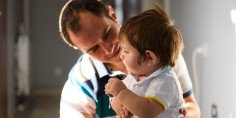The three-year pilot began in 2015. Phil Redmond Jr., director of The Duke Endowment’s Child Care program area, says the goal is to help children remain safely with relatives rather than entering — or re-entering — the foster care system.“
Growing evidence shows us that placement with relatives may be a better option than a placement in foster care,” Redmond says. “But many of these families face unique challenges. And despite the large number of children living with ‘kin,’ few services or supports ensure that they are thriving.”
Stephanie Cooper-Lewter, vice president of initiatives and public policy with Sisters of Charity, agrees.“
Family connections are important, but kinship caregivers can feel overwhelmed by the emotional and practical hurdles that come with their new role,” she says. “We wanted to pilot a program that would help families find the tools they need to be successful.”
Providing Resources
In the United States, nearly 3 million children are living with a relative because their parent is unable to provide care. In many cases, this “kinship care” is being offered by a grandparent.
Child welfare experts say the number has increased 18 percent over the past decade, fueled by the recession in 2008 and the opioid addiction crisis today.
In South Carolina, HALOS has worked with more than 800 families in a three-county area since launching its Kinship Care Program in 2007. The organization helps caregivers find resources, such as car seats, cribs and school supplies. Other services include home visits, referrals and monthly support groups. Staff members also work to create awareness about kinship care issues.
With its list of clients growing, HALOS zeroed in on urgent needs, says Kim Clifton, the executive director. But short-term solutions didn’t necessarily stabilize a family long-term.
“Kinship care families might think it’s going to be a temporary arrangement — while the parent goes through treatment for substance abuse, for example. And then, three years later, the situation hasn’t changed,” she says. “We felt a lot of families would benefit from more intense support.”
For the new pilot, HALOS is adapting an in-home coaching model that’s been successful in foster care in North Carolina and testing it in kinship homes.
In the North Carolina effort — launched by Catawba County Social Services with support from The Duke Endowment — Success Coaches work with children who are exiting foster care through reunification, adoption or guardianship, and provide ongoing support for the families they’re joining. Available 24⁄7, the coaches partner with the children and parents to assess needs, set goals, build skills, navigate community services, and prevent or intervene in crises.
Eight North Carolina counties now offer Success Coach services.






